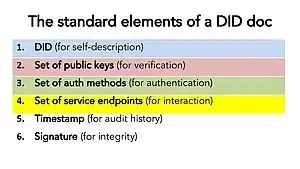Decentralized identifiers
Decentralized identifiers (DIDs) are a type of identifier that enables a verifiable, decentralized digital identity.[1] They are based on the Self-sovereign identity paradigm. A DID identifies any subject (e.g., a person, organization, thing, data model, abstract entity, etc.) that the controller of the DID decides that it identifies. These identifiers are designed to enable the controller of a DID to prove control over it and to be implemented independently of any centralized registry, identity provider, or certificate authority. DIDs are URLs that associate a DID subject with a DID document allowing trustable interactions associated with that subject. Each DID document can express cryptographic material, verification methods, or service endpoints, which provide a set of mechanisms enabling a DID controller to prove control of the DID. Service endpoints enable trusted interactions associated with the DID subject. A DID document might contain semantics about the subject that it identifies. A DID document might contain the DID subject itself (e.g. a data model).[2][3]

Standardization efforts
The W3C DID Working Group[4] is currently developing a standard for decentralized identifiers. It intends to standardize the core architecture, data model and representation of DIDs.
A working draft of the standard is available online.[5]
See also
External links
References
- "Decentralized Identifiers (DIDs) v1.0". www.w3.org. Retrieved 2020-11-15.
- "A Primer for Decentralized Identifiers - An introduction to self-administered identifiers for curious people". w3c.github.io. Retrieved 2020-05-26.
- "Decentralized Identifiers (DIDs)". World Wide Web Consortium. Retrieved 15 July 2020.
- "W3C DID Working Group". www.w3.org. Retrieved 2020-07-25.
- "Decentralized Identifiers (DIDs) v1.0". www.w3.org. Retrieved 2020-07-25.